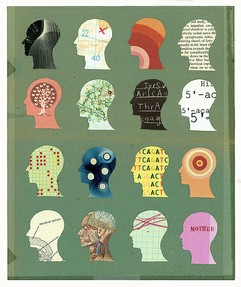The World Health Organization (WHO) says that being mentally healthy is not simply enjoying the absence of a mental disorder.
Here’s how the WHO puts it: “Mental health is an integral part of health; indeed, there is no health without mental health.”
Expanding on this the U.N. agency notes that “Mental health is a state of well-being in which an individual realizes his or her own abilities, can cope with the normal stresses of life, can work productively and is able to make a contribution to his or her community. In this positive sense, mental health is the foundation for individual well-being and the effective functioning of a community.”
The Canadian Mental Health Association says “The term mental illness is used to describe a wide range of different conditions. What they have in common is that they all affect a person’s emotions, thoughts, and behaviours - how they see themselves, see the world around them, and how they interact in that world.”

Mental Health Defined and Measured
by RupertTaylor
The world’s most pressing health issue is mental illness and very little is being done to alleviate it.
Causes of Mental Disorders
Some people are born with mental health problems; it’s part of the genes they inherited from their parents. Some people develop a mental disorder as they mature into adulthood; again, this is likely part of the genetic mapping that comes from our parents.
Much later in life some elderly folk develop mental disorders such as dementia and Alzheimer’s as part of the aging process and wearing out of brain cells.
 Social conditions can bring on mental disorders. Malnutrition during the early years will cause mental impairment and, says the WHO, poverty is associated with the increased likelihood of poor mental health. The WHO lists some other known factors that may create mental difficulties: “rapid social change, stressful work conditions, gender discrimination, social exclusion, unhealthy lifestyle, risks of violence and physical ill-health, and human rights violations.”
Social conditions can bring on mental disorders. Malnutrition during the early years will cause mental impairment and, says the WHO, poverty is associated with the increased likelihood of poor mental health. The WHO lists some other known factors that may create mental difficulties: “rapid social change, stressful work conditions, gender discrimination, social exclusion, unhealthy lifestyle, risks of violence and physical ill-health, and human rights violations.”
Physical injuries such as concussions also are likely to result in some form of mental impairment. Also, being involved with some sort of shocking experience - war, a car accident, a natural disaster – can trigger a serious mental health issue.
Mental disorders can also cause physical ailments to show up. In addition, people suffering from mental disease often try to self-medicate, using illicit drugs and alcohol in an effort to make themselves feel better.
Just as importantly, the Canadian Mental Health Association comments that mental disorders are NOT:
- Caused by bad parenting;
- A sign of personal weakness or failure;
- Punishment for bad deeds;
- Caused by spirits or demons;
- Contagious; or
- Anyone’s fault.
 | Anatomy of an Epidemic: Magic Bullets, Psychiatric Drugs, and the Astonishing Rise of Mental Illn... In this astonishing and startling book, award-winning science and history writer Robert Whitaker investigates a medical mystery: Why has the number of disabled mentally ill in t... |
A Massive Problem
BBC News says (October 2012) that “Nearly 450 million people have mental health disorders and more than three-quarters live in developing countries.” But, over their lifetimes, says the WHO, “One in four people develop some kind of mental illness.” That’s 1.75 billion people in some form of mental distress.
A study in 2004 found mental illness to be widespread. Researchers did face-to-face interviews with more than 60,000 people in 14 countries. Associated Press reported that the frequency of mental illness “ranged from 26.4 percent of people in the United States to 8.2 percent of people in Italy.”
 The problem is much worse in Afghanistan, which has endured three decades of warfare. The BBC says that “it’s estimated about half of Afghans over 15 years of age have mental health problems such as depression, anxiety, or post-traumatic stress disorder.”
The problem is much worse in Afghanistan, which has endured three decades of warfare. The BBC says that “it’s estimated about half of Afghans over 15 years of age have mental health problems such as depression, anxiety, or post-traumatic stress disorder.”
That 14-country study found that the most likely ailments people reported were panic attacks, phobias (of spiders, heights, confined spaces, blood, etc), and post-traumatic stress disorder. An exception turned up in Ukraine, where unemployment is very high and the country is struggling to become more westernized; there, mood disorders, such as depression, topped the list.
Incidence of Mental Illness in Canada
Roughly one in five Canadians (21.3%) will have a mental health issue at some time in their lives. This figure comes from the Canadian Mental Health Association (Alberta), which points out this represents 4.5 million people.
The most common ailments are anxiety problems, which affect more than four million people. Next comes depression (nine percent of the population, 2.5 million people). Personality disorders affect four percent of the population, about 1.4 million people. Schizophrenia is found in one percent of the population; that is about 350,000 people.
These numbers don’t add up to the 4.5 million total because many people suffer from more than one disorder.
Lack of Treatment for Mental Disorders
The amount of treatment for mental illness is woefully inadequate. In rich, developed countries therapy is available, but it is limited. Sometimes, there are simply not enough psychiatrists or psychologists to go around, but in many other cases the cost of treatment is a barrier to getting help.
 The Canadian Mental Health Association says that “Almost 20% of children and youth in Canada or roughly 1.5 million individuals suffer from a diagnosable psychiatric disorder. Two thirds of these [suffer] from more than one disorder and less than 20% receive therapeutic intervention.”
The Canadian Mental Health Association says that “Almost 20% of children and youth in Canada or roughly 1.5 million individuals suffer from a diagnosable psychiatric disorder. Two thirds of these [suffer] from more than one disorder and less than 20% receive therapeutic intervention.”
The National Alliance on Mental Illness in the U.S. notes that “Fewer than one-third of adults and one-half of children with a diagnosable mental disorder receive mental health services in a given year.”
In the developing world the situation is more dismal as detailed by the BBC: “According to the World Health Organization (WHO), eight in every 10 of those living in developing nations receive no treatment at all,” and, “almost half of the world’s population lives in a country where, on average, there is one psychiatrist or fewer to serve 200,000 people.”
Mental Treatment in Ghana
A BBC report on poor conditions in a Ghanaian mental hospital
Sources
“Mental Health: Strengthening our Response.” World Health Organization, October 2010.
“Mental Health Atlas 2011.” World Health Organization, October 19, 2011.
“Mental Disorders.” Canadian Mental Health Association, British Columbia Division, 2008.
“Global Study Finds Mental Illness Widespread.” Associated Press, July 7, 2007.
“Mental Health: Global Effort Sought.” Michelle Roberts, BBC News, October 10, 2012.
“Mental Illness in Canada.” Canadian Mental Health Association, Alberta Division, undated.
“Mental Illness: Facts and Numbers.” National Alliance on Mental Illness, undated.
You might also like
Positive Thinking or Realism: Which Side Are You On?There is nothing wrong with having a hopeful outlook on life. As long as one ...
Understanding DepressionIdentify the signs of depression in this module. Discover how you can help yo...










 American Cop Shakedownon 09/16/2014
American Cop Shakedownon 09/16/2014
 How Stores Manipulate Customerson 07/16/2014
How Stores Manipulate Customerson 07/16/2014
 Corruption in Russiaon 06/27/2014
Corruption in Russiaon 06/27/2014
 The Oak Island Treasureon 03/21/2014
The Oak Island Treasureon 03/21/2014



Comments
I was not aware of the connection between depression and abuse, although I'm sure abused and traumatized children must have some negative psychological deficits.
The brain doesn't develop correctly in abused and traumatized children. Most adults suffering from depression were abused as children. A lot has been written on this topic.